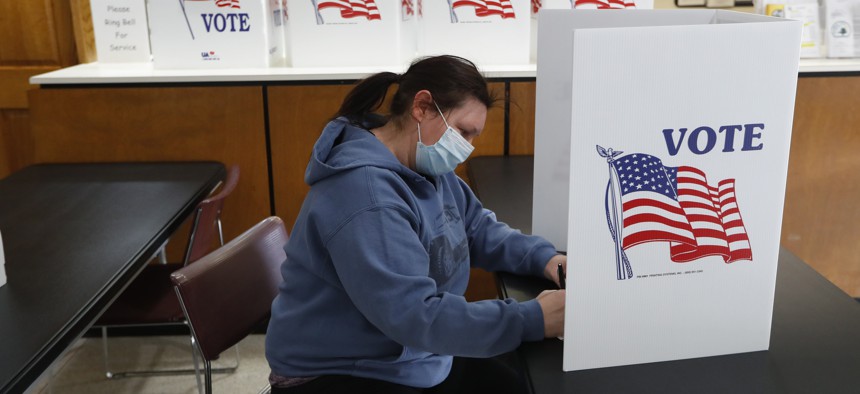Michigan Partners with NBA to Help Provide Election Support

In this Tuesday, May 5, 2020 file photo, a voter fills out an absentee ballot at City Hall in Garden City, Mich., as about 50 Michigan communities participate in largely mail-based local elections. AP Photo/Paul Sancya

Connecting state and local government leaders
As states prepare for increased voter turnout in November, they are pursuing new partnerships and poll worker recruitment efforts to get ready.
The primary elections held by a number of states this spring and summer demonstrated the challenges officials will face as they seek to increase mail-in voting, while still offering voters an opportunity to go to the polls.
But secretaries of state across the country say they are pushing ahead with new initiatives in anticipation of high voter turnout. That includes partnering with professional sports teams to turn empty arenas into large capacity voting centers on Election Day.
In Michigan, the Detroit Pistons have partnered with the Secretary of State’s Office to turn the team’s practice facility into a satellite voting center for the November general election.
But the partnership provides more than just a location for in-person voting, said Michigan Secretary of State Jocelyn Benson on a recent conference call hosted by the National Association of Secretaries of State. It will also provide a way to recruit poll workers and educate voters about the elections.
“These partnerships are between the teams, their assets, their athletes and election officials at the state and local level,” she said. “This isn’t a non-profit or organization with other agendas. This is simply a really pure partnership that furthers the needs as defined by the local election administrator.”
As part of the Pistons partnership, the team will give employees the day off for both Tuesday’s primary election and Nov. 3 to encourage the staff members to help out at polling centers. It’s become difficult for many local elections offices to recruit enough poll workers amid the coronavirus pandemic. More than half of poll workers nationwide are older people and at risk for complications from Covid-19.
The Pistons have also recorded a number of public service announcements about the upcoming elections to educate voters about how to cast ballots by mail.
A smattering of primary elections held earlier this year exposed the pressure points in state and local elections systems. Many states sought to increase their absentee voting capacity but still struggled to keep up with demand for mail-in ballots. At the same time, many voters showed up at the polls and ended up standing in long lines before getting to vote.
Even as both Republican and Democratic local election leaders have focused on increasing voters’ use of mail-in ballots, President Trump this week ramped up his criticism of voting by mail. He stated—incorrectly—that universal mail voting is “fraudulent,” even suggesting on Twitter that the Nov. 3 election could be delayed. That tweet was quickly criticized by both Republicans and Democrats, who have emphasized that the election will happen as scheduled and there is no mechanism to put it off except action by Congress.
State officials have focused on expanding mail voting with the expectation that coronavirus will remain a big enough concern in the fall that it will deter many people from voting in person. Connecticut became the latest state to expand mail-in voting options, as lawmakers voted this week to allow no-excuse absentee ballot voting as a public health precaution.
Even with expanded absentee voting in place for primary elections, states are still troubleshooting how to ensure in-person voting is accessible and lines don’t grow too long at polling places.
To help with poll worker recruitment efforts, the Ohio secretary of state created a program that gives practicing attorneys four hours of continuing legal education credits if they work a full shift at the polls on Election Day.
In Nebraska, the state launched a media campaign to recruit a new pool of poll workers. Various associations, ranging from public accountants to realtors, responded to set up poll worker training for their members, said Robert Evnen, Nebraska’s Secretary of State on the NASS call.
As a result of the extra recruitment efforts and training, he said the state’s polling places were well-staffed during the May primary.
“We now have a whole new generation of poll workers,” he said. “A lot of those people, I expect, will be back in November.”
Andrea Noble is a staff correspondent with Route Fifty.

NEXT STORY: DOD plans next JEDI announcement by end of August




